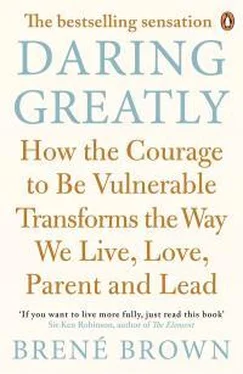I’m a skilled interviewer, but I can imagine that the look on my face conveyed something like “How on earth did you pull that off?” Without waiting for my next question, he answered, “She doesn’t want to know. If she already knows, she wants me to keep pretending. Trust me, if I find another job and tell her after I’m back at work, she’ll be grateful. Knowing would change the way she feels about me. She didn’t sign up for this.”
I was not prepared to hear over and over from men how the women—the mothers, sisters, girlfriends, wives—in their lives are constantly criticizing them for not being open and vulnerable and intimate, all the while they are standing in front of that cramped wizard closet where their men are huddled inside, adjusting the curtain and making sure no one sees in and no one gets out. There was a moment when I was driving home from an interview with a small group of men and thought, Holy shit. I am the patriarchy .
Here’s the painful pattern that emerged from my research with men: We ask them to be vulnerable, we beg them to let us in, and we plead with them to tell us when they’re afraid, but the truth is that most women can’t stomach it. In those moments when real vulnerability happens in men, most of us recoil with fear and that fear manifests as everything from disappointment to disgust. And men are very smart. They know the risks, and they see the look in our eyes when we’re thinking, C’mon! Pull it together. Man up. As Joe Reynolds, one of my mentors and the dean at our church, once told me during a conversation about men, shame, and vulnerability, “Men know what women really want. They want us to pretend to be vulnerable. We get really good at pretending.”
Covert shame hurts just as much as overt shame. Take, for example, the man who told me that he was always feeling shame with his wife around money. He said the latest instance was when his wife came home and said, “I just saw Katie’s new house! It’s amazing. She’s so happy to finally get that dream house. On top of that, she’s going to quit working next year.”
He told me his immediate response was rage. So he picked a fight with his wife about her mother coming to visit, and then quickly disappeared to another part of the house. As we were talking about this conversation, he said, “It was shame. Why did she have to say that? I get it. Katie’s husband makes a lot of money. He takes better care of her. I can’t compete.”
When I asked him if he thought that it was her intention to hurt him or shame him, he responded, “I’m not sure. Who knows? I turned down a job that paid a lot more but required traveling three weeks out of the month. She said she was supportive, and that she and the kids would miss me too much, but now she makes little comments about money all of the time. I have no idea what to think.”
PISSED OFF OR SHUT DOWN
I don’t want to oversimplify something as complex as the response to shame, but I have to say that when it comes to men, there seem to be two primary responses: pissed off or shut down. Of course, like women, as men develop shame resilience, this changes, and men learn to respond to shame with awareness, self-compassion, and empathy. But without that awareness, when men feel that rush of inadequacy and smallness, they normally respond with anger and/or by completely turning off.
Once I had collected enough interviews to start seeing strong patterns and themes, I scheduled interviews with several male therapists who specialize in men’s issues. I wanted to make sure that I wasn’t filtering what I heard from the men through my own experiences. When I asked one of these therapists about the concept of “pissed off or shut down,” he told me this story to illustrate the point.
When he was a freshman in high school, he tried out and made the football team. On the first day of practice, his coach told the boys to line up on the line of scrimmage. The therapist had grown up playing a lot of football in his neighborhood, but this was his first experience on a field, in full pads, across from boys whose goal was to flatten him. He said, “I was suddenly afraid. I was thinking about how much it was going to hurt, and I guess that fear showed up on my face.”
He said his coach yelled his last name and said, “Don’t be a pussy! Get on the line.” He said he immediately felt shame coursing through his body. “In that single moment, I became very clear about how the world works and what it means to be a man:
“I am not allowed to be afraid.
“I am not allowed to show fear.
“I am not allowed to be vulnerable.
“Shame is being afraid, showing fear, or being vulnerable.”
When I asked him what he did next, he looked me in the eye and said, “I turned my fear into rage and steamrolled over the guy in front of me. It worked so well that I spent the next twenty years turning my fear and vulnerability into rage and steamrolling anyone who was across from me. My wife. My children. My employees. There was no other way out from underneath the fear and shame.”
I heard such grief and clarity in his voice as he was saying this to me. It made total sense. Fear and vulnerability are powerful emotions. You can’t just wish them away. You have to do something with them. Many men, in fact, use very physiological descriptions when they talk to me about “pissed off or shut down.” It’s almost as if shame, criticism, and ridicule are physically intolerable.
The therapist concluded, “I got into therapy when my rage and my drinking were no longer manageable. When it started costing me my marriage and my relationships with my children. That’s why I do the work I do today.”
Shame resilience—the four elements we discussed in the previous chapter—is about finding a middle path, an option that allows us to stay engaged and to find the emotional courage we need to respond in a way that aligns with our values.
I’M ONLY AS HARD ON OTHERS AS I AM ON MYSELF
Just like the father coming down on his budding artist son or the coach giving his player a hard time, women can also be very hard on other women. We are hard on others because we’re hard on ourselves. That’s exactly how judgment works. Finding someone to put down, judge, or criticize becomes a way to get out of the web or call attention away from our box. If you’re doing worse than I am at something, I think, my chances of surviving are better.
Steve and I met lifeguarding and coaching swimming. The big rule in lifeguarding is to utilize any means possible before you actually jump in and try to pull someone out of the water. Even though you’re a strong swimmer and the person you’re trying to help is half your size, a desperate person will do anything to save themselves—to grab a breath—including drowning you in their effort to survive. The same is true for women and the shame web. We’re so desperate to get out and stay out of shame that we’re constantly serving up the people around us as more deserving prey.
What’s ironic (or perhaps natural) is that research tells us that we judge people in areas where we’re vulnerable to shame, especially picking folks who are doing worse than we’re doing. If I feel good about my parenting, I have no interest in judging other people’s choices. If I feel good about my body, I don’t go around making fun of other people’s weight or appearance. We’re hard on each other because we’re using each other as a launching pad out of our own perceived shaming deficiency. It’s hurtful and ineffective, and if you look at the mean-girl culture in middle schools and high schools, it’s also contagious. We’ve handed this counterfeit survival mechanism down to our children.
In my interviews with teachers and school administrators, two patterns emerged that speak directly to this issue. The first pattern reported by faculty and principals was that often the children who are engaging in the bullying behaviors or vying for social ranking by putting down others have parents who engage in the same behaviors. When it came to girls, the phrase that kept emerging from the interviews was “The parents aren’t upset by their daughters’ behaviors; they’re proud of them for being popular.” One school administrator likened this behavior to the fathers who first ask, “Well, did he at least win the fight?”
Читать дальше






![Брене Браун - Вопреки. Как оставаться собой, когда всё против тебя [litres]](/books/436389/brene-braun-vopreki-kak-ostavatsya-soboj-kogda-v-thumb.webp)





